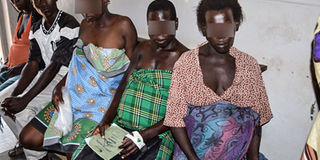Lira health facilities struggle with abnormal pregnancies

Antenatal. Expectant Women wait for services at Amach Health Centre IV in Lira District in northern Uganda. PHOTO BY ISAAC OTWII
What you need to know:
- In 2018, HEPS-Uganda conducted a survey which indicated that out of the 145 public, private and mission health facilities, only 53 had magnesium sulphate in stock.
Lira. A large number of government health facilities in Lira District are struggling to manage expectant mothers with preeclampsia condition.
Lack of enough blood pressure (BP) machines, designated preeclampsia ward, a postnatal ward and lack of patient trolleys are some of the challenges experienced.
Preeclampsia is a pregnancy disorder characterised by hypertension especially after 20 weeks of pregnancy.
The condition is the second cause of maternal deaths worldwide.
For instance, Lira Regional Referral Hospital, which receives about 100 expectant mothers daily for antenatal care, has only one blood pressure machine.
The facility registers more than 70 mothers annually with preeclampsia condition.
Lira hospital serves nine districts of Lango Sub-region, including Lira, Oyam, Alebtong, Amolatar, Dokolo, Kole, Otuke, Kwania and Apac.
During the commemoration of world Preeclampsia Day on May 22, health facilities in Lira called for support from government to enable them handle mothers with the condition.
Sr Judith Nanyonjo, a senior principal nursing officer at Lira hospital, said lack of enough blood pressure machines has often impeded their struggle to detect and manage the condition.
Some pregnant mothers miss out on the diagnosis that can be detected and contained if in an early stage through constant monitoring.
The senior nursing officer, however, confirmed that Lira hospital has resorted to borrowing BP machines from intern doctors. “But this is not reliable since they leave the facility after their training,” she said.
From an open market, a blood pressure machine costs on average about Shs200,000.
The other challenge faced at the hospital is lack of a designated pre-eclampsia and a postnatal ward to accommodate more than 20 deliveries daily.
“The maternity ward is almost condemned as it is almost collapsing on mothers. This ward was constructed in 1927 and it has never been renovated,” she says.
She added that the ward also faces a challenge of lack of patient trolleys to transfer mothers to and from the theatre.
“As you well know, mothers with pre-eclampsia need immediate attention and any minute one spent without operating the mother has an impact on the survival of the mother and the baby. We are currently using stretchers that require four people to carry the patient who may not be there at that moment,” the nursing officer said.
Sr Nanyonjo, however, said the hospital management is engaging the Ministry of Health to get solutions.
Mr Jino Okot, the in--charge of Ogur Health Centre IV, said there is need to improve the skills of the health workers to administer magnesium sulphate, a vital drug that is used in managing preeclampsia.
“Most of the health workers do not have skills to diagnose preeclampsia. Some of them do not even know how to mix and administer magnesium Sulphate. The Ministry of Health should understand that health workers need training if we are to ably manage the condition,” he says.
“For example at Ogur Health Centre IV, we don’t have a medical doctor to work in the theatre. How do you expect us to operate on a mother?” he asked.
Dr Isaac Orec, the in-charge of Amach Health Centre IV, said his facility lacks electricity and therefore the theatre cannot operate.
“When we get a mother with such a condition, we refer them to Lira Regional Referral Hospital. Sometimes these mothers who don’t have money for the ambulance which costs Shs50,000,” he said.
Amach receives at least 10 mothers with preeclampsia on a monthly basis.
Ms Susan Aciro, a midwife at Lira hospital, said she suffered from preeclampsia and was operated on the seventh month of pregnancy.
Ms Aciro said she was able to survive because her blood pressure was closely monitored.
Mr Edmond Acaka, Lira District assistant health officer-in-charge of maternal and child health, appealed to the Ministry of Health to come to the rescue of the district by increasing its budget.
Ms Beatrice Nyangoma, the communications officer for HEPS-Uganda, said government should consider regulating prices for magnesium sulphate to improve affordability and availability.




